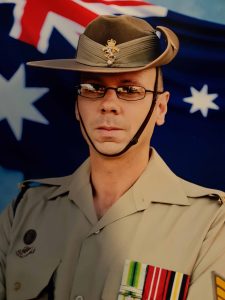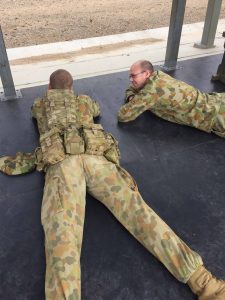Studying a Charles Sturt University undergraduate degree, raising a family and training the next generation of Australian Army recruits is all in a day’s work for Platoon Sergeant Andrew Harris. Working long hours at the Kapooka Army Barracks on the outskirts of Wagga Wagga, Sergeant Harris decided his next challenge would be to formalise his qualifications with a professionally recognised Bachelor of Adult and Vocational Education to open up options for his next career move.

Sergeant Harris’s training in the Army enabled him to receive generous credits towards his degree, because at Charles Sturt we believe your experience matters. And the flexibility of supported online study enabled him to spend valuable time with his family and keep up his passion for running in his spare time.
Sergeant Harris shared his experience as an online student and full-time platoon sergeant with Insight.
Andrew Harris
Platoon Sergeant, Australian Army
Bachelor of Adult and Vocational Education student
What made you decide to study with us to enhance your career?
Charles Sturt University provided a pathway for Defence members with a vocational competence and a Certificate IV in Training and Assessment to gain recognition of prior learning (RPL) for three subjects. I gained my Certificate III in Automotive Mechanical (Heavy Vehicle Road Transport) to conduct my job role as a vehicle mechanic in the Army and a Certificate IV in Training and Assessment through promotion courses. This allowed me to gain three subjects towards an Associate Degree in Adult and Vocational Education, giving me a decent head start in gaining the Associate Degree. I continued on to the Bachelor of Adult and Vocational Education due to the support I received from university staff through my time studying.
What course are you studying and where do you want to take your career?
I’m currently in the final subjects of a Bachelor of Adult and Vocational Education specialising in Vocational Education and Training. In the future, I’ll be aiming to enhance my career for postings in or related to training design and development or instructional roles.

What is your current role in the Australian Defence Force (ADF)?
My current role is that of a platoon sergeant at the 1st Recruit Training Battalion. I’m responsible for four staff and up to 60 recruits as they progress through the Army Recruit Course. I am accountable for the discipline of the platoon and the conduct of platoon-level drill lessons, weapon theory lessons and field craft lessons.
What are some of the skills, knowledge and attributes gained through the ADF that are transferable to the civilian workforce?
The Army core skills of Courage, Initiative, Respect and Teamwork along with discipline taught within the Army are all key attributes that would transfer well into civilian life.
How has your previous experience and training acquired through the ADF prepared you for university study?
Often in the Army I’m required to work long/unusual hours, particularly in the role of a platoon sergeant. This has assisted me in being disciplined while studying. Allocating time to study even due to a heavy work-life load or when fatigued has allowed me to successfully complete course outcomes.
How do you balance Army life, study and your other commitments?
Luckily I have a very supportive family and supervisors who are willing to allocate time for me to complete my studies. Although restricted, I still have plenty of time to go for a run to ensure I maintain a level of fitness.
What does a typical day look like for you and how does your study routine fit into this?
The day usually starts with a personal training session, ranging from strength or endurance to circuit-type sessions. Throughout the day I conduct various platoon administration tasks, recruit lessons, weapons training and range shoots. I try to dedicate at least 1 to 2 hours of study every day to ensure I keep on top of assessments. I take many of my subject readings with me to lessons and ranges so if I have a spare moment I can conduct some study for my next career move.
With a bit of dedication, you can conduct tertiary study while working part-time.
How will a degree impact upon your career? Are you looking to progress in your current field or take your career in a new direction?
At this stage I’m looking to progress in my current stream. However, the Australian Army does have education officers, a specialist position in the Army responsible for overseeing all training design, development, evaluation and conduct within the unit. In future I may apply for the role.
What are the benefits of studying a degree during your service with the ADF? Is there any flexibility around study, exams and any work placements?
I’m currently under the Defence Assisted Study Scheme (DASS); Defence has financially supported the majority of my degree and has allowed me to take time off to conduct assessment and a work placement in the past. I have received study advice and support from education officers, training organisations within Defence such as the Defence Force School of Signals and various supervisors throughout the degree.
Can you share any support services that have made the transition to study easier?
The initial subject, Written Communication, allowed me to explore and develop essay writing skills.
What are some highlights from your experience with us?
Prompt responses from facilitators when I have asked questions, receiving detailed feedback on assessments in order to inform future assessment tasks.
What is your best advice for other serving Defence members considering studying a degree with Charles Sturt University?
Discuss with your supervisor the support options for Defence members pursuing tertiary education. Understand that you have more spare time than you think you do. With a bit of dedication, you can conduct tertiary study while working part-time.
Enhance your career – your Experience Matters
Are you a former or currently serving member of the Australian Defence Force? If you’re looking enhance your career or you want to shift outside of Defence, get in touch with our friendly team to find out how your Experience Matters.


You must be logged in to post a comment.